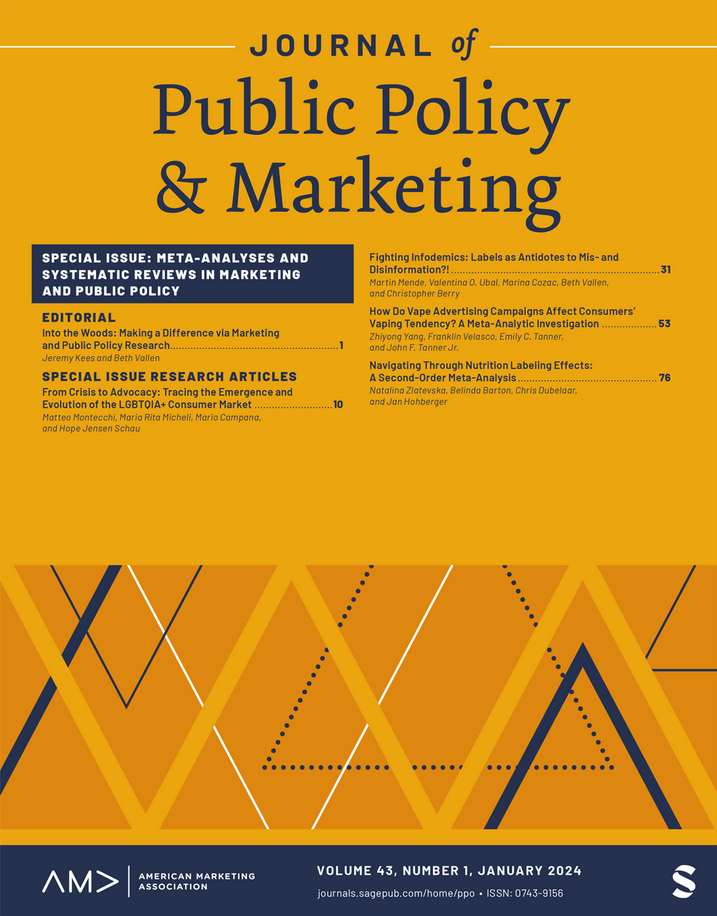Are Sugar-Sweetened Beverage Taxes Effective? Reviewing the Evidence Through a Marketing Systems Lens
IF 4.7
3区 管理学
Q1 BUSINESS
引用次数: 11
Abstract
The overconsumption of sugar-sweetened beverages (SSBs) is associated with noncommunicable diseases such as obesity, type 2 diabetes, and cancer. Voluntary industry codes have largely failed to curb the overconsumption of sugar, and governments globally are increasingly willing to impose taxes on SSBs. However, the effectiveness of SSB taxation varies significantly. Drawing on a systematic review of the most recent literature (N = 79), the authors find that heterogeneity in outcomes is likely to result from idiosyncratic conditions within marketing systems. Building on marketing systems theory, they identify and critically evaluate (omitted) factors within the marketing environment that have an impact on the effectiveness of SSB taxation. Findings reveal that most studies to date focus on demand-side issues, often omitting supply-side responses such as reformulation or pass-through rates. Furthermore, studies largely disregard evidence from marketing and behavioral sciences, which show that taxation works through psychological mechanisms other than price. Finally, the authors find that few studies have systematically evaluated the complementary effects of SSB taxation and other health-promoting policies. By highlighting these blind spots in the current SSB taxation knowledge, the authors provide fruitful avenues for future research at the nexus of marketing and public policy.含糖饮料税有效吗?从营销系统的角度审视证据
过度饮用含糖饮料与肥胖症、2型糖尿病和癌症等非传染性疾病有关。自愿性行业法规在很大程度上未能遏制糖的过度消费,全球各国政府越来越愿意对ssb征税。然而,SSB税收的有效性差异很大。通过对最新文献的系统回顾(N = 79),作者发现结果的异质性可能是由营销系统内的特殊条件造成的。在营销系统理论的基础上,他们识别并批判性地评估(省略)营销环境中对SSB税收有效性产生影响的因素。调查结果显示,迄今为止,大多数研究都集中在需求方面的问题上,往往忽略了供给方面的反应,如重新制定或传递率。此外,研究在很大程度上忽视了市场营销和行为科学的证据,这些证据表明,税收是通过心理机制而不是价格机制起作用的。最后,作者发现很少有研究系统地评估了SSB税收和其他健康促进政策的互补效应。通过强调当前SSB税收知识中的这些盲点,作者为市场营销和公共政策关系的未来研究提供了富有成效的途径。
本文章由计算机程序翻译,如有差异,请以英文原文为准。
求助全文
约1分钟内获得全文
求助全文
来源期刊

Journal of Public Policy & Marketing
BUSINESS-
CiteScore
10.20
自引率
15.40%
发文量
29
期刊介绍:
Journal of Public Policy & Marketing welcomes manuscripts from diverse disciplines to offer a range of perspectives. We encourage submissions from individuals with varied backgrounds, such as marketing, communications, economics, consumer affairs, law, public policy, sociology, psychology, anthropology, or philosophy. The journal prioritizes well-documented, well-reasoned, balanced, and relevant manuscripts, regardless of the author's field of expertise.
 求助内容:
求助内容: 应助结果提醒方式:
应助结果提醒方式:


